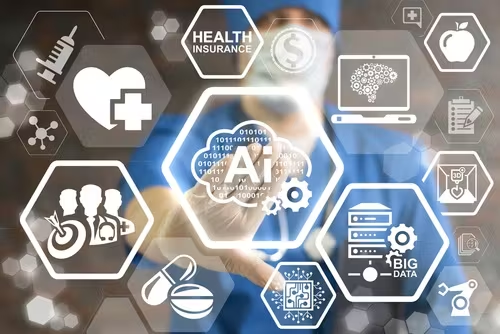The healthcare industry is rapidly evolving, and a quiet revolution is taking place in the field of medical data management. With the integration of AI (Artificial Intelligence) and Machine Learning (ML) technologies, healthcare providers are discovering more efficient, accurate, and intelligent ways to manage patient information, predict outcomes, and enhance overall care.
From accurately analyzing vast pools of patient data to improving administrative efficiency, AI and ML have become indispensable tools for medical staff and office managers. This blog explores how these innovative technologies are transforming medical data management, offering new opportunities for healthcare innovators and investors while streamlining everyday hospital operations.
Smarter Data Organization with Machine Learning
One of the most significant challenges in healthcare is managing enormous amounts of patient data, often stored across various systems and formats. Enter Machine Learning—a subset of AI capable of identifying patterns within complex datasets.
Using algorithms, ML can process and cross-reference patient data such as medical history, test results, and treatment plans more quickly than any human team. This not only ensures more comprehensive data analysis but also minimizes errors caused by manual input.
For instance, some hospitals now leverage advanced medical software to collect, analyze, and store patient records more securely and efficiently. With tools powered by ML, doctors and nurses no longer need to sift through fragmented systems, making their workloads significantly more manageable.
Predictive Analytics and Better Patient Outcomes
AI’s ability to predict health outcomes is perhaps one of its best contributions to modern medicine. By analyzing historical patient data and identifying trends, predictive models can forecast potential health risks, allowing for timely interventions.
Consider this example—AI models can predict which patients are at a higher risk of complications after surgery by analyzing their vitals, comorbidities, and past records. Similarly, in managing chronic diseases such as diabetes or heart conditions, predictive analytics help healthcare providers design personalized care plans while reducing long-term costs.
Such advancements are a game-changer for health insurers and investors. The cost-saving potential coupled with improved patient satisfaction makes predictive analytics a smart investment.
Enhanced Administrative Efficiency
Beyond patient care, AI and ML are revolutionizing how healthcare facilities operate on an administrative level. From billing operations to appointment scheduling, these technologies streamline workflows, saving hospitals both time and money.
Take appointment scheduling, for instance. AI-powered scheduling tools can assess availability, optimize time slots, and even minimize the chances of no-shows by sending automated reminders. Furthermore, claims processing and billing systems enhanced by AI ensure accuracy while minimizing costly delays or errors.
For office managers, this means fewer tedious administrative tasks, letting them focus on improving the patient experience and handling day-to-day operations more effectively.
Improved Security in Medical Data
Healthcare organizations hold a treasure trove of sensitive data, making them prime targets for cyberattacks. AI is bolstering the security of medical data by detecting vulnerabilities and offering intelligent solutions to strengthen cybersecurity.
Advanced encryption, AI-driven monitoring of access logs, and real-time alerts for suspicious activities are just a few ways ML safeguards patient information. These technologies can spot unusual user behavior far faster than traditional security measures, ensuring compliance with privacy regulations and protecting against costly breaches.
Fostering Research and Innovation
AI and ML have also significantly accelerated medical research. Researchers use these technologies to analyze clinical trial outcomes, study genetic sequencing, and even identify new drug candidates at a pace that was previously unimaginable.
For example, advancements in AI-driven drug discovery have cut years off the timeline for clinical development. Meanwhile, hospitals equipped with integrated systems can use anonymized patient data to identify gaps in care and opportunities for new treatments.
This fosters an ecosystem of continuous improvement, ultimately benefiting both patients and the bottom line for healthcare investors.
A Future of AI-Powered Collaboration
The future of healthcare points toward seamless collaboration between AI and its human counterparts. Medical professionals are increasingly relying on AI not as a replacement but as a partner in their decision-making processes.
By combining human expertise with the computational power of AI, hospitals can deliver exceptional, patient-focused care. This collaborative approach not only enhances trust but also ensures ethical applications of these new technologies in day-to-day practices.
Takeaway
AI and Machine Learning are not just buzzwords in the healthcare industry—they are the backbone of medical innovation and operational efficiency. From predictive analytics that save lives to AI-driven medical software that ensures secure data management, these technologies empower healthcare providers to do what they do best—care for their patients.
By adopting these tools, hospitals and clinics can reduce errors, improve security, and deliver personalized treatment plans that cater to individual patient needs. Whether you’re a healthcare innovator, investor, or medical professional, now is the time to explore how AI can transform your medical operations.

Dilawar Mughal is an accomplished author with a passion for storytelling. His works span various genres, from thrilling mysteries to heartfelt romance novels. With a keen eye for detail and a knack for character development, Sana Fatima weaves engaging narratives that captivate readers and transport them to new worlds.










